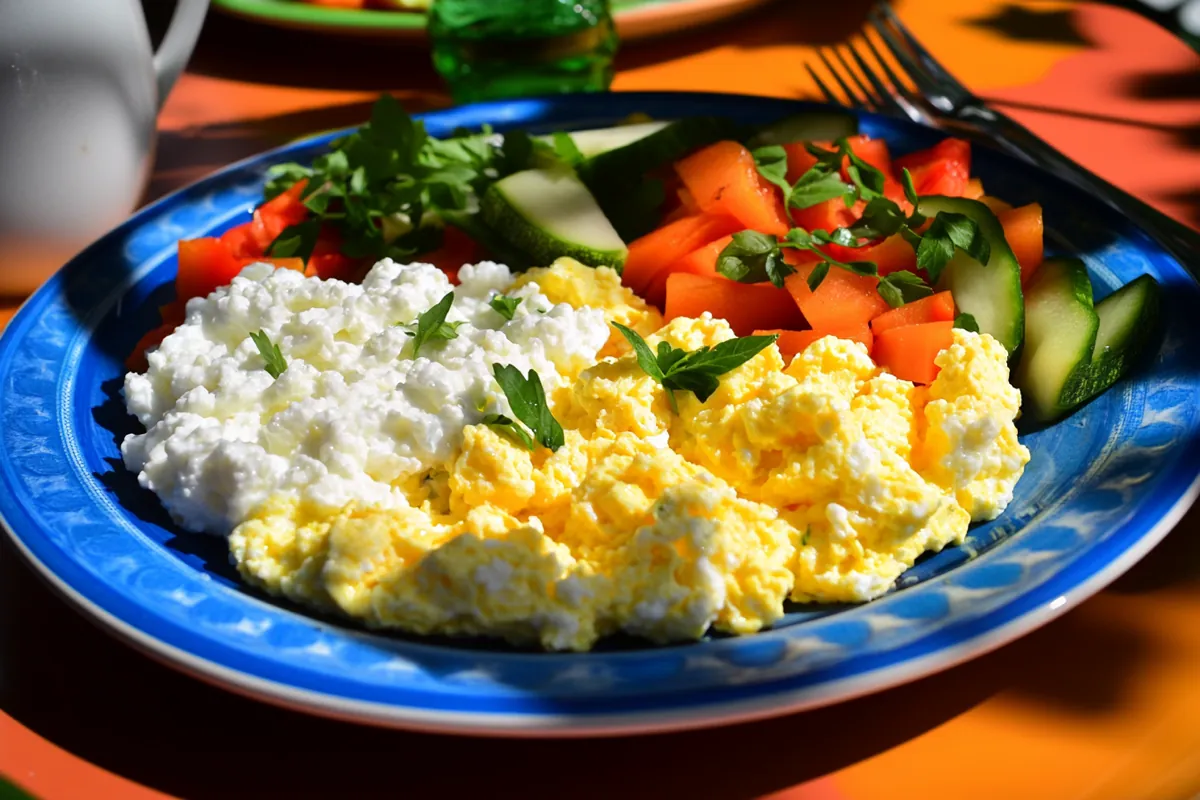Do you want to enhance your meals with something nutritious and delicious? Healthy cottage cheese eggs are the perfect combination to consider. This meal is not only packed with protein but also incredibly versatile, making it a great choice for breakfast or any time of day. In this guide, we’ll explore the many benefits of cottage cheese and eggs, how they can aid in weight loss, and share some delightful recipes to inspire your cooking.
Table of Contents
Introduction to Healthy Cottage Cheese Eggs
Cottage cheese and eggs are two powerhouse ingredients that fit into a healthy lifestyle. Combining them creates a nutrient-rich meal that supports good health and helps maintain a balanced diet.
Nutritional Benefits of Cottage Cheese
Cottage cheese is often praised for its impressive nutritional profile.
High Protein Content
One of the most significant advantages of cottage cheese is its high protein content. A single cup can provide about 25 grams of protein, which is essential for muscle repair and growth. This makes it an excellent choice for those looking to increase their protein intake without consuming too many calories.
Low in Calories
Moreover, cottage cheese is low in calories. A cup typically contains around 200 calories, making it a great option for anyone managing their weight. This allows you to enjoy a satisfying meal without worrying about excess calories.
Rich in Essential Nutrients
In addition to protein and calories, cottage cheese is rich in essential nutrients. It contains calcium, which supports bone health, as well as B vitamins, which are crucial for energy metabolism. These nutrients contribute to overall well-being and help maintain a healthy body.
Overview of Eggs and Their Health Benefits
Eggs are another nutritional powerhouse. They are often referred to as a “superfood” due to their various health benefits.
Complete Protein Source
Eggs are known for being a complete protein source, meaning they contain all nine essential amino acids. This quality makes them an excellent choice for muscle maintenance and overall health.
Healthy Fats and Vitamins
Additionally, eggs provide healthy fats that are beneficial for heart health. They also contain vitamins A, D, and E, which are vital for maintaining good vision, bone health, and skin integrity.
Support for Eye Health
Lastly, eggs are rich in antioxidants like lutein and zeaxanthin, which support eye health. These compounds help reduce the risk of age-related macular degeneration, ensuring your vision remains sharp as you age.
Eggs and Cottage Cheese for Weight Loss
When it comes to weight loss, combining eggs and cottage cheese can be particularly effective.
Benefits of Combining Eggs and Cottage Cheese
The synergy between these two ingredients provides numerous benefits for those looking to shed some pounds.
Satiety and Weight Management
First, the high protein content of both cottage cheese and eggs promotes satiety. This means you’ll feel fuller for longer, reducing the likelihood of snacking between meals. Consequently, it becomes easier to manage your weight.
Low-Calorie Meal Options
Second, meals featuring eggs and cottage cheese are low in calories yet high in nutritional value. This combination allows you to create satisfying meals without overindulging in calories.
Eggs and Cottage Cheese Recipe for Weight Loss
If you’re looking for quick meal ideas, here are two simple recipes to try.
Quick and Easy Breakfast Ideas
Scrambled Eggs with Cottage Cheese: Whisk together eggs and cottage cheese in a bowl. Pour into a hot skillet and cook until fluffy. Add salt and pepper to taste.
Cottage Cheese and Egg Salad: Mix cottage cheese with diced hard-boiled eggs, chopped celery, and a sprinkle of dill for a refreshing salad.
Meal Prep Strategies
To make meal prep easier, you can prepare a large batch of scrambled eggs mixed with cottage cheese at the beginning of the week. Simply portion it out for quick breakfasts or snacks throughout the week.

How to Prepare Healthy Cottage Cheese Eggs
Preparing healthy cottage cheese eggs is simple and requires minimal ingredients. In this section, we will discuss the essential ingredients and provide step-by-step cooking instructions.
Essential Ingredients Needed
Before you start cooking, gather the following essential ingredients for your healthy cottage cheese eggs.
Quality Cottage Cheese
First and foremost, choose high-quality cottage cheese. Look for options that are low in fat and contain minimal additives. This will ensure you’re getting the best nutrition possible while enjoying a creamy texture.
Types of Eggs to Use
Next, select the type of eggs you prefer. Organic or free-range eggs are excellent choices as they are often richer in flavor and nutrients compared to conventional eggs.
Step-by-Step Cooking Instructions
Now that you have your ingredients, let’s walk through the cooking process.
Preparing the Base
Start by cracking the eggs into a mixing bowl. Whisk them thoroughly until the yolks and whites are well combined. This step helps create a fluffy texture when cooked.
Cooking Techniques: Baking vs. Scrambling
You can choose to scramble the eggs or bake them, depending on your preference.
Scrambled Method:
- Heat a non-stick skillet over medium heat.
- Add a dollop of coconut oil or olive oil to the pan.
- Pour the beaten eggs into the skillet and gently stir with a spatula.
- As the eggs begin to set, add the cottage cheese and continue to cook until the mixture is fluffy and fully cooked.
Baked Method:
- Preheat your oven to 350°F (175°C).
- In a baking dish, combine the whisked eggs and cottage cheese.
- Add any optional vegetables or seasonings you desire.
- Bake for about 20-25 minutes, or until the eggs are set and lightly golden on top.
Eggs with Cottage Cheese Bake: A Delicious Recipe
Baking eggs with cottage cheese is a delightful way to enjoy this nutritious combination. This recipe is simple and packed with flavor.
Ingredients for Eggs with Cottage Cheese Bake
To make a delicious eggs with cottage cheese bake, you will need the following ingredients:
- 6 large eggs
- 1 cup cottage cheese
- 1 cup chopped vegetables (e.g., spinach, bell peppers, or tomatoes)
- Salt and pepper to taste
- Optional: shredded cheese or herbs for topping
Optional Add-ins: Vegetables and Spices
Feel free to get creative with your add-ins. You can include ingredients like onions, garlic, or spices like paprika to enhance the flavor.
Cooking Instructions for Eggs with Cottage Cheese Bake
Follow these simple steps to create a hearty baked dish:
Mix the Ingredients: In a large bowl, whisk together the eggs and cottage cheese. Stir in the chopped vegetables, salt, and pepper. If you’re using optional add-ins, mix them in as well.
Prepare the Baking Dish: Lightly grease a baking dish with cooking spray or a bit of oil.
Bake: Pour the mixture into the prepared baking dish. Bake in a preheated oven at 350°F (175°C) for 20-25 minutes, or until the eggs are set and the top is golden.
Serve: Let the dish cool slightly before slicing it into squares. Serve warm, and enjoy!
Baking Tips for Perfect Texture
To achieve the perfect texture, avoid overbaking. Keep an eye on the dish, as ovens can vary. You want the center to be set but still moist.
Serving Suggestions
Pair your eggs with cottage cheese bake with a side salad or whole-grain toast for a balanced meal.

Cottage Cheese Recipes Featuring Eggs
Incorporating cottage cheese into egg dishes adds flavor and nutrition. This section presents creative recipes that highlight the versatility of cottage cheese and eggs, making them suitable for any meal of the day.
Creative Cottage Cheese and Egg Dishes
Here are two delightful recipes that you can easily prepare at home.
Cottage Cheese Omelette
A cottage cheese omelette is a quick and satisfying option for breakfast or brunch.
Ingredients:
- 3 large eggs
- ½ cup cottage cheese
- 1 cup spinach (or other vegetables)
- Salt and pepper to taste
- Olive oil or butter for cooking
Instructions:
- Whisk the eggs in a bowl and season with salt and pepper.
- Heat a non-stick skillet over medium heat and add olive oil or butter.
- Pour the eggs into the skillet and let them cook for a minute.
- Add the cottage cheese and spinach to one half of the omelet.
- Once the eggs are set, fold the omelet in half and serve warm.
Cottage Cheese and Egg Muffins
These muffins are perfect for meal prep and can be enjoyed throughout the week.
Ingredients:
- 6 large eggs
- 1 cup cottage cheese
- 1 cup diced bell peppers
- ½ cup chopped onions
- Salt and pepper to taste
Instructions:
- Preheat your oven to 350°F (175°C).
- In a large bowl, whisk together the eggs and cottage cheese.
- Stir in the diced vegetables and season with salt and pepper.
- Pour the mixture into a greased muffin tin, filling each cup about ¾ full.
- Bake for 20-25 minutes or until the muffins are set and lightly golden.
Nutritional Comparison of Recipes
Now, let’s compare the nutritional value of these two recipes.
Caloric Content Analysis
- Cottage Cheese Omelette: Approximately 300 calories per serving, depending on the amount of oil used.
- Cottage Cheese and Egg Muffins: Roughly 150 calories per muffin, making them a great low-calorie option.
Macronutrient Breakdown
- Cottage Cheese Omelette: High in protein due to the eggs and cottage cheese, with healthy fats from the cooking oil.
- Cottage Cheese and Egg Muffins: A balanced mix of protein and carbohydrates, with minimal fats, making them a wholesome snack.
Tips for Incorporating Cottage Cheese and Eggs into Your Diet
To reap the benefits of healthy cottage cheese eggs, it’s important to incorporate them into your daily meals. Here are some practical tips to help you do just that.
Daily Meal Ideas with Cottage Cheese and Eggs
Here are some simple meal ideas that include cottage cheese and eggs throughout the day.
Breakfast, Lunch, and Dinner Options
- Breakfast: Start your day with a cottage cheese omelette or a bowl of scrambled eggs mixed with cottage cheese and fresh herbs.
- Lunch: Prepare a cottage cheese and egg salad using hard-boiled eggs, cottage cheese, diced vegetables, and a light dressing.
- Dinner: Try a baked egg dish with cottage cheese and seasonal vegetables for a satisfying evening meal.
Storage Tips for Cottage Cheese and Eggs
Storing these ingredients properly ensures they remain fresh for longer.
Best Practices for Freshness
Cottage Cheese: Always keep cottage cheese in the refrigerator and consume it within a week of opening. Store it in an airtight container to maintain its texture and flavor.
Eggs: Store eggs in their original carton in the refrigerator. This helps prevent them from absorbing odors from other foods and maintains their quality.

Conclusion: Embrace Healthy Cottage Cheese Eggs
As we’ve explored, healthy cottage cheese eggs are not just a nutritious option; they are incredibly versatile and can be enjoyed in various ways. With their high protein content, low calorie count, and rich nutrient profile, they make an excellent choice for anyone looking to improve their diet.
Recap of Health Benefits
We’ve discussed how both cottage cheese and eggs can contribute to muscle health, weight management, and overall well-being. By incorporating these ingredients into your meals, you can enhance your nutrition and enjoy delicious dishes at the same time.
Encouragement to Experiment with Recipes
Don’t hesitate to experiment with different recipes and flavors. The combination of cottage cheese and eggs offers endless possibilities, from savory to sweet.
Final Thoughts on Healthy Eating with Cottage Cheese and Eggs
Incorporating healthy cottage cheese eggs into your diet is a simple yet effective way to nourish your body. By trying out the recipes and tips shared in this guide, you’ll be well on your way to enjoying a healthier lifestyle.
So, gather your ingredients and start cooking today!
FAQ
As we explore healthy cottage cheese eggs, you may have some questions. Here are the answers to common queries.
Is Cottage Cheese Good with Eggs?
Yes, cottage cheese pairs wonderfully with eggs. The combination enhances the flavor and adds a creamy texture, making meals more enjoyable while boosting their nutritional value.
Is Cottage Cheese Actually Healthy?
Absolutely! Cottage cheese is low in calories and high in protein, making it a healthy addition to any diet. It also provides essential nutrients like calcium and B vitamins.
Is Cottage Cheese a Good Substitute for Eggs?
Cottage cheese can serve as a substitute for eggs in some recipes, particularly in baking. It adds moisture and protein, though it may not provide the same binding properties as eggs.
How Much Cottage Cheese Equals One Egg?
Generally, ¼ cup of cottage cheese can replace one large egg in recipes. However, this substitution works best in baked goods or dishes where the egg’s primary role is moisture rather than structure.
This knowledge about cottage cheese and eggs can help you make informed choices in your cooking, ensuring you enjoy nutritious meals every day.




